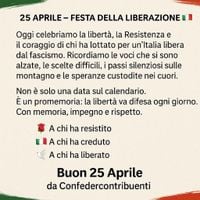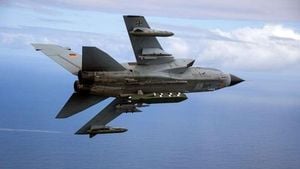Today, April 25, 2025, marks the eightieth anniversary of the Liberation of Italy from Nazifascism, a significant occasion celebrated across the country with various ceremonies and processions. President Sergio Mattarella is in Genoa today to commemorate this pivotal moment in Italian history.
The day began early in Genoa, where a procession formed at the Staglieno cemetery at 7:30 AM. Participants laid wreaths at the Israeli field, monuments dedicated to internees and deportees in Nazi concentration camps, and the Trento and Trieste shrine. This solemn act of remembrance set the tone for the day’s events.
President Mattarella is scheduled to attend a ceremony at the Ivo Chiesa theater at 12:00 PM, which was moved up to allow him to return to Rome for the funeral of Pope Francis, taking place on Saturday, April 26, 2025. Mattarella’s presence underscores the importance of this anniversary, as he joins other officials in honoring Italy's hard-won freedom.
Later in the day, at 3:00 PM, a gathering is set to occur in Piazza della Vittoria along Via Cadorna. The procession will commence at 3:30 PM, accompanied by the music of the Filarmonica Sestrese, and is expected to reach the monumental bridge by 4:00 PM. Here, wreaths will be laid at the shrine of the Fallen Partisans, followed by a reading of the motivation for the Gold Medal for Military Valor awarded to the City of Genoa and the Act of Surrender of the German troops.
Following this, the procession will move to Largo Pertini for additional wreath-laying at the plaques of Luciano Bolis and Sandro Pertini. The final act of the day will take place in Piazza Matteotti at 4:45 PM, where institutional greetings will be delivered by Deputy Mayor Pietro Piciocchi and the President of the Liguria Region, Marco Bucci. Paolo Corsini, president of the Ferruccio Parri National Institute, will deliver the commemorative speech.
In addition to the events in Genoa, celebrations are taking place throughout Italy. Prime Minister Giorgia Meloni, who also participated in the wreath-laying ceremony at the Altare della Patria alongside President Mattarella, emphasized the significance of the day. "In this day, the nation honors its regained freedom and reaffirms the centrality of those democratic values that the fascist regime had denied," she stated.
Across the country, processions and commemorations reflect the spirit of resistance and the commitment to democracy. In Rome, the ANPI (National Association of Italian Partisans) organized a march, with banners proclaiming, "Now and always resistance." This sentiment resonates deeply, especially in light of the ongoing mourning for Pope Francis.
However, the day has not been without controversy. Political tensions surfaced following clashes in Turin during a previous event. Carlo Calenda, leader of the Azione party, accused the left of attempting to monopolize the celebration by excluding other groups from participating in the torchlight procession. He stated, "Every year the left tries to appropriate a national holiday, excluding participants who they consider 'not aligned' at will," calling this practice a "fascist" approach contrary to the values of freedom and democracy.
Matteo Salvini, Italy's Deputy Prime Minister, also weighed in on the disturbances, suggesting that the country needs liberation from both violence and ignorance. He remarked, "If the morning shows the day, the 'liberation' we hope for is from violence and imbecility." These comments highlight the ongoing political divisions that can overshadow such a unifying occasion.
In Rome, the Jewish community held its own procession, laying a wreath near the Cestia Pyramid. The event was closely monitored by law enforcement, with a significant police presence ensuring safety amid heightened tensions. The community's participation is a reminder of the historical significance of this day, as they continue to champion the values of antifascism.
Meanwhile, pro-Palestinian protesters gathered at Porta San Paolo, chanting slogans calling for liberation from perceived oppression. Their presence adds another layer to the day's events, demonstrating that even amidst celebrations of liberation, there are ongoing struggles that resonate with many Italians today.
As the day unfolds, the themes of freedom, democracy, and remembrance are at the forefront. The words of Prime Minister Meloni echo through the celebrations: "Today we renew our commitment so that this anniversary can become more and more a moment of national harmony, in the name of freedom and democracy, against all forms of totalitarianism, authoritarianism, and political violence." This call for unity is crucial as Italy reflects on its past and looks toward the future.
In essence, the eightieth anniversary of the Liberation of Italy serves not only as a commemoration of historical events but also as a reminder of the ongoing responsibilities of citizens to uphold democratic values. As the nation honors its history, it must also confront the challenges of today, striving for a future that embodies the ideals fought for so many years ago.




